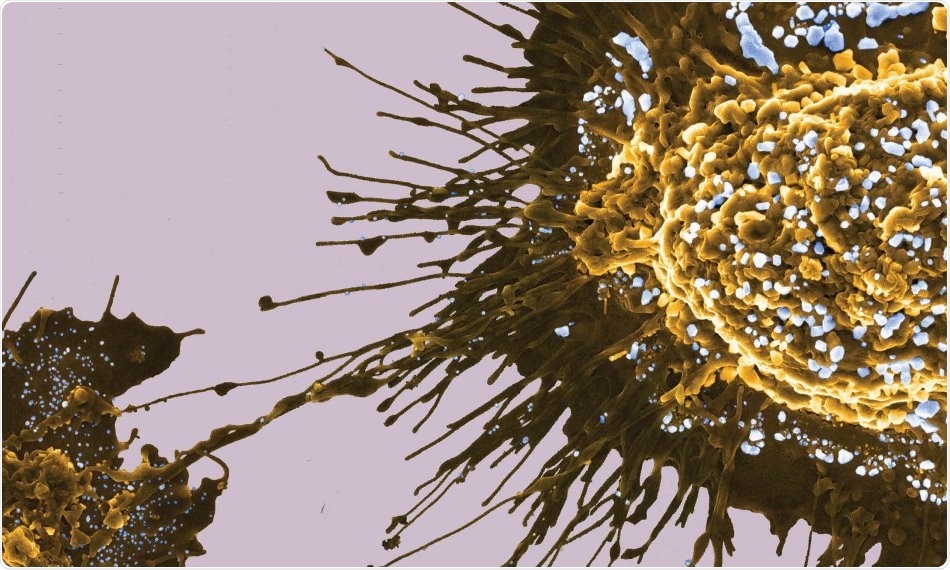In a breakthrough development for low-cost, personalized medicine, scientists have used metal-organic frameworks (MOFs) to effectively deliver the CRISPR/Cas9 genetic snipping tool into human cancer cells.

MOFs on the surface of metastasizing prostate cancer cells. Image Credit: Chemical Communications.
For the first time, the team used MOFs, which were improved with a green tea phytochemical coating, to target the prostate cancer cells in humans.
The latest approach for deploying the genetic snipping tool directly into the target cells represents a major step towards safer, cheaper, and more effective gene therapy with treatment potential for numerous genetic disorders.
Ravi Shukla, a lead researcher, and Associate Professor stated that MOFs, which are biocompatible and versatile nanomaterials, was a promising option to present-day viral techniques used for delivering the CRISPR/Cas9 gene-editing tool.
MOFs have the capacity to carry larger genetic loads and as a non-viral option, have the added benefit of being a safer prospect for patients than viral alternatives.”
Ravi Shukla, Study Lead Researcher and Associate Professor, RMIT University
The CRISPR/Cas9 tool, which received the 2020 Nobel Prize in Chemistry, is broadly recognized as a groundbreaking discovery in genetic editing for its capability to eliminate and substitute faulty DNA, but effectively delivering this tool to cells continues to pose the biggest challenge.
At present, there are just 13 approved techniques in trial worldwide and all these methods depend on viral therapies—a method that is not only very expensive but also linked to health risks.
RMIT University has collaborated with the CSIRO, which had earlier designed a technology to carry and guard the biomolecules with MOFs.
Dr. Cara Doherty, a Research Team Leader from CSIRO, stated that the CSIRO had also designed technologies to produce large-scale amounts of numerous MOFs, with the ability to considerably decrease the cost of bringing them to market.
We’re excited to find a novel way in which these materials can address complex biological issues, including targeting specific medicinal purposes like gene therapy.”
Dr Cara Doherty, Research Team Leader, CSIRO
Cells are not developed to naturally adopt DNA material or foreign genes, and the risks related to inserting a virus into the body have delayed the progress of studies into viral methods to gene therapy.
To additional enhance the potential of the MOF to penetrate the host cell, it was coated with a phytochemical present in green tea, known as epigallocatechin gallate (EGCG), which is recognized for its anti-cancer and antioxidant properties.
Arpita Poddar, the study’s co-author, stated the EGCG operated is by attaching it to the surface of the MOF, helping it to penetrate the host cell.
We found an increase in cellular uptake of more than 23% for EGCG coated MOFs compared to uncoated ones.”
Arpita Poddar, Study Co-Author, RMIT University
The recent discoveries build on earlier studies performed by the researchers, who designed a proof of concept for the new delivery model late in 2019.
The team will next work to additionally test this novel technology for use in targeting many other disease-causing genes.
Source:
Journal reference:
Poddar, A., et al. (2020) ZIF-C for targeted RNA interference and CRISPR/Cas9 based gene editing in prostate cancer. Chemical Communications. doi.org/10.1039/D0CC06241C.